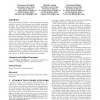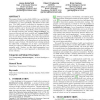68 search results - page 12 / 14 » Reaction functions for task allocation to cooperative agents |
135
click to vote
CORR
2011
Springer
14 years 8 months ago
2011
Springer
Modeling the behavior of imperfect agents from a small number of observations is a difficult, but important task. In the singleagent decision-theoretic setting, inverse optimal co...
120
Voted
HICSS
2007
IEEE
15 years 7 months ago
2007
IEEE
Systems using Software Agents (or Multi-Agent Systems, MAS) are becoming more popular within the development mainstream because, as the name suggests, an Agent aims to handle task...
ATAL
2003
Springer
15 years 6 months ago
2003
Springer
Auctions are useful mechanism for allocating items (goods, tasks, resources, etc.) in multiagent systems. The bulk of auction theory assumes that the bidders’ valuations for ite...
112
click to vote
ATAL
2008
Springer
15 years 3 months ago
2008
Springer
This paper presents MADeM, a multi-modal agent decision making to provide virtual agents with socially acceptable decisions. We consider multi-modal decisions as those that are ab...
ATAL
2008
Springer
15 years 3 months ago
2008
Springer
We propose Markov random fields (MRFs) as a probabilistic mathematical model for unifying approaches to multi-robot coordination or, more specifically, distributed action selectio...


